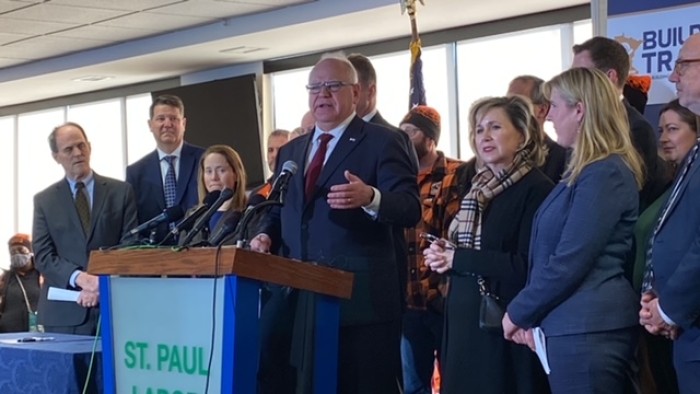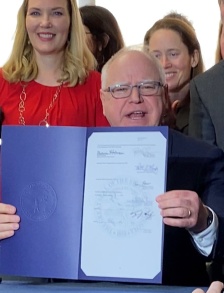100% Carbon-Free by 2040: It’s the law!
 | Madelyn Smerillo, Regional Policy Manager |

 | Madelyn Smerillo, Regional Policy Manager |

Today, Governor Walz of Minnesota officially signed the state's 100% Clean Energy bill into law. The bill, House File 7 (HF7), was one of the first policies addressed by the legislature this session, reflecting the priority the state has placed on the clean energy transition.
"What this bill does, and makes it very clear, that no longer is this debate about moving toward a clean energy future, on sustainability of the planet, and our economic future are no longer divided. They run hand in hand," said Governor Walz. "Many in this room have known that, but we needed to make sure we had the legislation behind it to make it happen. The thoughtfulness of this legislation, the ability to address issues as they come up but always putting in place Minnesota's ability to innovation is going to be at the front end of this."
This law sets a new 100% carbon-free electricity standard by 2040 and increases Minnesota's Renewable Energy Standard (RES) to 55% by 2035. It also provides the Minnesota Public Utilities Commission (PUC) with the tools needed to achieve the RES and Carbon Free Standards.
"Adding renewables to our grid and producing electricity that way is often cheaper than building new fossil fuel plants...," said Representative Melissa Hortman. "This creates more energy independence for the state of Minnesota, which means more reliability in the future, more affordability in the future."
“The bill that we are about to sign today could stand up to any 100% clean energy bill in the country. In fact, this is one of the top five most ambitious clean energy bills passed in the United States.
House author and Majority Leader Jamie Long
While this is a celebratory moment, the ambition of this law must be matched with implementation. Clean Grid Alliance (CGA) is responsible for several of the law's provisions on clean energy deployment, working to streamline the permitting process to make 100% clean energy possible by 2040. These provisions:
- Eliminate the Certificate of Need (CN) Requirement for Independent Power Producer (IPP) wind and solar projects to better reflect Minnesota's changing energy landscape;
- Reform permitting by changing certain requirements for low voltage transmission lines; and
- Improve the environmental review process by removing unnecessary red tape.
CGA Senior Policy Associate, Madelyn Smerillo, testified in the House and Senate energy committee hearings on the bill and informed legislators about these provisions. Outside the hearings, advocacy included coordination with other NGOs and bill authors to establish CGA's language in the final version.
Subscribe to our newsletter for the latest on energy & our work
"We are excited that HF 7 sets a 100% carbon-free standard while including provisions to help us get there," said CGA Executive Director Beth Soholt. "Our focus in Minnesota now shifts to implementing this legislation – working with utilities, communities, the Minnesota Public Utilities Commission. While the 100% carbon-free law incorporates essential reforms to the permitting process, we will continue to look at what else is needed to pave the way for utility-scale renewables in the state. The hard work begins now for the next decade and beyond."
In his closing remarks at the bill signing, Majority Leader Long said, "Minnesota's clean energy leadership is back, and it is here to stay." With the passing of this bill, we recognize there is still work that must be done to ensure this legislation is effectively implemented, and Clean Grid Alliance plans to dive right in.